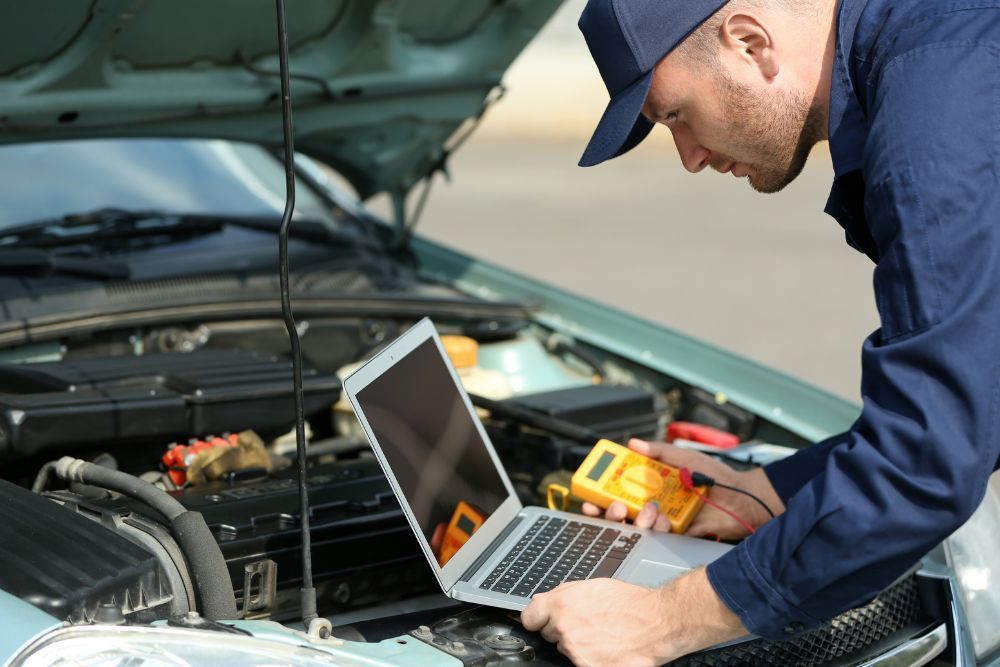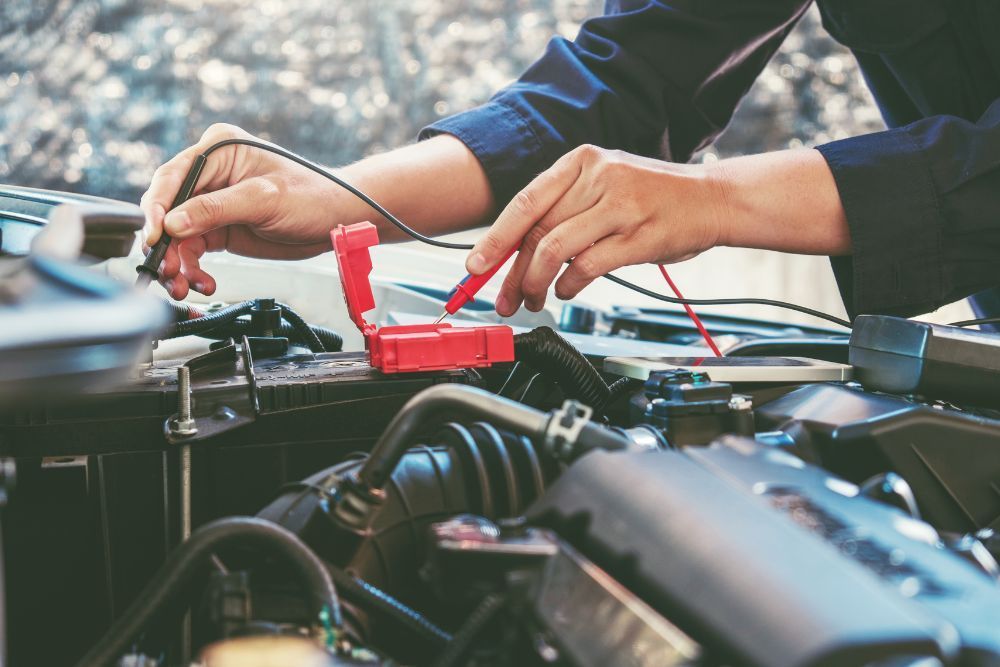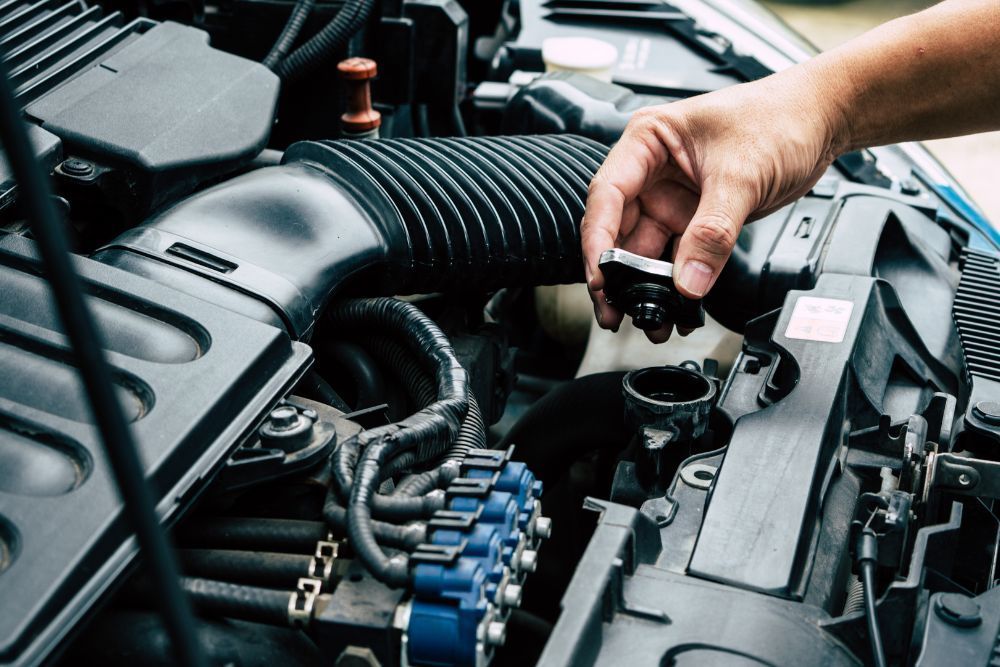Our Blog
Expert brake repair services in Lakeland, FL at Joyce Automotive and Towing. Ensure your safety on the road. Visit us today!

Your car works hard in Central Florida's demanding climate. Between scorching summer heat, sudden thunderstorms, and the stop-and-go traffic around Lakeland's growing population, your vehicle faces challenges that can lead to expensive breakdowns if you're not proactive. Preventative maintenance isn't just a suggestion—it's essential insurance against costly repairs and dangerous roadside emergencies. What Is Preventative Maintenance? Preventative maintenance means servicing your vehicle before problems occur, rather than waiting for something to break. It's like getting regular checkups at the doctor to catch health issues early. By following a maintenance schedule and addressing small issues promptly, you can avoid major repairs and keep your vehicle running reliably for years. Think of it this way: replacing worn brake pads costs around $200, but ignoring them until they damage your rotors can cost $800 or more. A simple oil change costs $50, but engine replacement from oil neglect can cost $5,000 or more. Why Preventative Maintenance Matters More in Central Florida Florida's climate creates unique challenges that make regular maintenance even more critical: Extreme Heat: Summer temperatures in Lakeland regularly exceed 90°F, with engine compartments reaching 200°F or higher. This heat accelerates fluid breakdown, stresses cooling systems, and can cause rubber components to crack and fail. High Humidity: Florida's moisture causes accelerated corrosion of metal parts, especially in the brake system, exhaust components, and electrical connections. Frequent Rain: Our wet roads increase brake wear and stress on tires, while moisture can affect electrical systems and air filters. Year-Round Driving: Unlike northern states where cars get winter breaks, Florida vehicles accumulate miles and wear continuously throughout the year. Stop-and-Go Traffic: Whether it's construction on I-4, theme park traffic, or busy shopping areas like Lakeland Square Mall, frequent stopping and starting increases wear on brakes, transmission, and engine components. Essential Preventative Maintenance Services Oil Changes: Your engine's lifeblood needs regular replacement, especially in Florida's heat. Hot weather breaks down oil faster, so don't stretch oil change intervals beyond manufacturer recommendations. Most vehicles need oil changes every 3,000-7,500 miles depending on driving conditions. Cooling System Service: Florida heat puts enormous stress on your cooling system. Regular coolant flushes, radiator cleaning, and hose inspections prevent overheating that can destroy your engine. Brake Inspections: Wet roads and frequent stopping wear brakes faster in Central Florida. Regular brake inspections catch worn pads before they damage expensive rotors or compromise your safety. Air Filter Replacement: Florida's pollen, dust, and frequent storms clog air filters quickly. A clean air filter improves fuel economy and protects your engine from debris. Transmission Service: Stop-and-go traffic and heat stress automatic transmissions. Regular fluid changes and inspections can prevent expensive transmission failures. Tire Rotation and Alignment: Hot pavement and potholes around Lakeland affect tire wear and wheel alignment. Regular rotation ensures even wear and maximum tire life. Battery Testing: Heat is harder on car batteries than cold. Regular testing can predict battery failure before you're stranded in a parking lot. Creating Your Maintenance Schedule Don't rely on memory or hope for the best. Create a maintenance schedule based on: Manufacturer Recommendations: Your owner's manual provides the best baseline for maintenance intervals. These schedules consider normal driving conditions, so adjust for Florida's demanding climate. Driving Conditions: City driving, frequent short trips, and stop-and-go traffic all qualify as "severe" conditions that require more frequent service. Mileage and Time: Some services are based on miles driven, others on time elapsed. Follow whichever comes first. Visual Inspections: Monthly checks of fluid levels, tire condition, and warning lights can catch problems early. Warning Signs You've Fallen Behind Neglected maintenance often shows itself through these symptoms: Dashboard Warning Lights: Don't ignore check engine lights, oil pressure warnings, or temperature alerts. These indicate problems that need immediate attention. Unusual Noises: Grinding brakes, squealing belts, or knocking engines all signal maintenance needs. Fluid Leaks: Puddles under your car indicate failing seals or components that need replacement. Performance Changes: Rough idling, poor acceleration, or decreased fuel economy often result from skipped maintenance. Overheating: If your car runs hot in Lakeland's summer traffic, your cooling system needs attention immediately. The Economics of Prevention Preventative maintenance saves money in multiple ways: Avoiding Major Repairs: A $300 timing belt replacement prevents a $3,000 engine rebuild if the belt breaks. Better Fuel Economy: Well-maintained vehicles get better gas mileage, saving money at the pump. Extended Vehicle Life: Regular maintenance can help your car last 200,000 miles or more, delaying expensive replacement. Higher Resale Value: Maintenance records significantly increase your vehicle's trade-in or resale value. Reduced Emergency Costs: Planned maintenance costs less than emergency roadside repairs, especially if you're stranded during evening or weekend hours. Choosing a Maintenance Provider Regular maintenance requires a trusted automotive partner who understands both your vehicle and local driving conditions. Look for: ASE-certified technicians with proper training Digital inspections that show you exactly what needs attention Honest recommendations that prioritize your safety and budget Comprehensive services so you can handle multiple needs in one visit Local expertise understanding Central Florida's unique challenges Don't Wait for Problems Preventative maintenance isn't exciting, but it's far less stressful and expensive than dealing with breakdowns. In Central Florida's demanding climate, regular service isn't optional—it's essential for safe, reliable transportation. A well-maintained vehicle is also safer for your family, more reliable for your daily commute, and less likely to leave you stranded during Florida's unpredictable weather. Stay Ahead of Problems Your vehicle's preventative maintenance needs don't pause for your schedule, and Florida's climate doesn't give your car any breaks. By staying proactive with regular service, you protect your investment and ensure reliable transportation for years to come. Ready to protect your vehicle with professional preventative maintenance? Joyce Automotive and Towing has been keeping Central Florida vehicles running reliably since 1968. Our ASE-certified technicians understand how local driving conditions affect your vehicle and can create a maintenance schedule that fits your needs and budget. From oil changes to comprehensive inspections, we provide the preventative care your vehicle needs. Call (863) 249-0162 or visit us at 1034 E Main St in Lakeland. We offer digital vehicle inspections, free second opinions, and honest assessments of your vehicle's maintenance needs. Don't wait for a breakdown—schedule your preventative maintenance today. We're open Monday through Friday 8:00 AM to 5:30 PM and Saturday 8:00 AM to 2:00 PM.

Your wheels might look straight, but even small alignment problems can cause big headaches for drivers in Lakeland. Poor wheel alignment doesn't just wear out your tires—it puts stress on your entire steering and suspension system. If you've noticed your car pulling to one side on Lakeland Hills Boulevard or your steering wheel vibrating on I-4, alignment issues might be the culprit. What Is Wheel Alignment? Wheel alignment refers to how your wheels are positioned relative to each other and your vehicle's frame. When properly aligned, all four wheels point in the same direction and make optimal contact with the road. This ensures your car tracks straight, handles predictably, and wears tires evenly. Three main angles determine proper alignment: Toe: Whether your wheels point slightly inward or outward when viewed from above. Imagine your feet—"toe-in" means your toes point toward each other, while "toe-out" means they point away. Camber: The tilt of your wheels when viewed from the front or rear. Negative camber means the tops of your wheels lean inward, while positive camber means they lean outward. Caster: The angle of your steering axis when viewed from the side. This affects steering stability and how your steering wheel returns to center after turning. How Alignment Problems Affect Your Steering When your wheels aren't properly aligned, your steering system works overtime to compensate. Here's what happens: Steering Wheel Pull: If your car constantly drifts left or right, you're fighting against misaligned wheels. This is especially noticeable on straight roads like the Polk Parkway, where you should be able to drive with minimal steering input. Off-Center Steering Wheel: When driving straight, your steering wheel should be centered. If it's tilted to one side, your alignment is off. This puts constant stress on steering components and makes precise steering more difficult. Steering Wheel Vibration: Alignment issues can cause your steering wheel to shake or vibrate, especially at highway speeds. This happens because your wheels are fighting each other instead of working together. Difficult Steering: Poor alignment can make your steering feel heavy or unresponsive. Your power steering system has to work harder to overcome the misaligned wheels, potentially shortening its lifespan. Poor Steering Return: After making a turn, your steering wheel should naturally return to center. Alignment problems can prevent this, making your car feel unstable and requiring constant steering corrections. Impact on Your Suspension System Your suspension system is designed to work with properly aligned wheels. When alignment is off, suspension components face increased stress: Uneven Component Wear: Misaligned wheels force suspension parts to work at incorrect angles, causing premature wear on ball joints, tie rod ends, and control arm bushings. Shock and Strut Stress: Your shocks and struts must work harder to control wheels that aren't tracking properly. This reduces their effectiveness and shortens their lifespan. Spring Fatigue: Alignment problems can cause uneven weight distribution, making your springs work unevenly and potentially leading to sagging or failure. Bearing Problems: Wheel bearings face increased stress when wheels aren't properly aligned, potentially causing noise, vibration, and premature failure. Common Causes of Alignment Problems in Central Florida Lakeland's roads and driving conditions create unique alignment challenges: Potholes and Road Damage: Florida's frequent rain and temperature changes create potholes that can knock your wheels out of alignment with a single impact. Areas like downtown Lakeland's older streets are particularly problematic. Construction Zones: With ongoing road improvements throughout Polk County, construction debris and uneven surfaces can affect alignment. Parking Lot Curbs: Shopping centers and parking lots around Lakeland have curbs that are easy to hit when parking, especially higher curbs that can bend suspension components. Speed Bumps: Aggressive speed bumps in residential areas and shopping centers can gradually affect alignment if taken too fast. Normal Wear: Even under perfect conditions, alignment gradually changes as suspension components wear and settle over time. Signs You Need an Alignment Check Don't wait for obvious problems to develop. Watch for these early warning signs: Tire Wear Patterns: Uneven tire wear is often the first sign of alignment problems. Check for wear on the inside or outside edges of your tires, or wear that's heavier on one side than the other. Vehicle Pulling: If your car drifts to one side on level roads, alignment is likely the cause. Test this on a straight, level road with minimal traffic. Steering Wheel Position: Note your steering wheel position when driving straight. If it's not centered, you need an alignment. Vibration: Steering wheel vibration, especially at highway speeds, often indicates alignment issues. Handling Changes: If your car doesn't handle corners as well as it used to, or feels less stable, alignment could be the problem. Benefits of Proper Wheel Alignment Keeping your wheels properly aligned provides multiple benefits: Extended Tire Life: Proper alignment can double or triple your tire life by ensuring even wear patterns. In Florida's hot climate, this saves significant money over time. Better Fuel Economy: Misaligned wheels create rolling resistance, forcing your engine to work harder. Proper alignment can improve gas mileage by reducing this drag. Improved Safety: Good alignment means better handling, shorter stopping distances, and more predictable steering response—crucial for navigating Central Florida's busy roads. Reduced Repair Costs: Proper alignment reduces stress on steering and suspension components, preventing premature wear and expensive repairs. Comfortable Driving: Eliminate steering wheel vibration, pulling, and the fatigue that comes from constantly fighting your steering wheel. When to Get an Alignment Most experts recommend checking alignment annually or every 12,000-15,000 miles. However, Central Florida's road conditions may require more frequent checks. Always get an alignment after: Hitting a significant pothole or curb Installing new tires Replacing suspension components Noticing any of the warning signs mentioned above Professional Alignment Service Matters Modern vehicles require precise alignment using computerized equipment. DIY alignment is impossible without professional tools and expertise. A quality alignment service should include checking all angles, adjusting as needed, and providing before-and-after measurements. Experiencing steering problems or uneven tire wear in Lakeland? Joyce Automotive and Towing provides precision wheel alignment services using state-of-the-art equipment. Our ASE-certified technicians understand how Central Florida's road conditions affect wheel alignment and can restore your vehicle's proper tracking and handling. Call (863) 249-0162 or visit us at 1034 E Main St in Lakeland. From digital vehicle inspections to complete suspension repairs, we keep your vehicle steering straight and handling safely. We're open Monday through Friday 8:00 AM to 5:30 PM and Saturday 8:00 AM to 2:00 PM. Don't let alignment problems cost you money on tires and repairs—let our experienced team get you back on track!
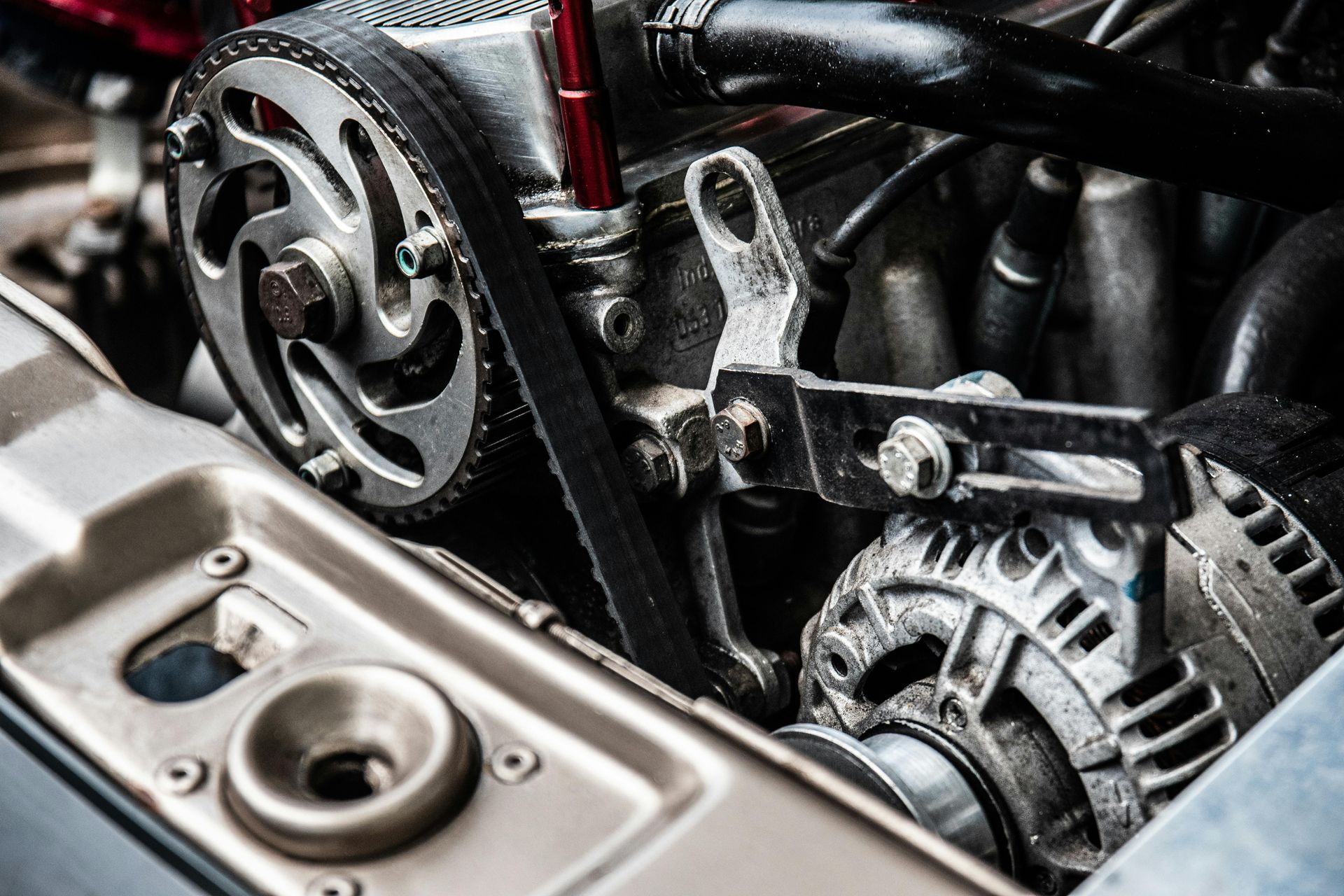
A solid check engine light is concerning, but a flashing check engine light is an emergency. If you're driving through downtown Lakeland or cruising on I-4 and notice your check engine light blinking rapidly, you need to take immediate action. A flashing check engine light indicates a serious engine misfire that can cause expensive catalytic converter damage within minutes. The Difference Between Solid and Flashing Check Engine Lights Solid Check Engine Light: Indicates a problem that needs attention but usually won't cause immediate damage. You can typically drive to a repair shop for diagnosis, though you shouldn't delay too long. Flashing Check Engine Light: Signals an active engine misfire that's dumping unburned fuel into your exhaust system. This can destroy your catalytic converter—a $1,000+ repair—in just a few minutes of driving. Pull over safely and stop driving immediately. What Causes a Flashing Check Engine Light Engine misfires happen when one or more cylinders fail to burn fuel properly. In Central Florida's demanding climate, several factors contribute to this problem: Ignition System Problems: Worn spark plugs, damaged ignition coils, or faulty spark plug wires are the most common causes. Florida's heat and humidity accelerate the breakdown of these components, especially in older vehicles. Fuel System Issues: Clogged fuel injectors, a failing fuel pump, or contaminated fuel can prevent proper fuel delivery. Ethanol fuel, common in Florida gas stations, can cause fuel system problems in older vehicles not designed for ethanol blends. Engine Timing Problems: A stretched or broken timing chain/belt can throw off your engine's timing, causing misfires. Stop-and-go traffic around Lakeland's busy areas puts extra stress on timing components. Vacuum Leaks: Cracked vacuum hoses or failed gaskets allow extra air into the engine, disrupting the fuel-to-air ratio. Florida's heat causes rubber and plastic components to crack faster than in cooler climates. Carbon Buildup: Short trips around town don't allow engines to get hot enough to burn off carbon deposits. This buildup can interfere with proper combustion and cause misfires. Why Central Florida Conditions Make Misfires More Common Our local driving environment creates unique challenges that increase misfire risk: Extreme Heat: Summer temperatures regularly exceed 90°F, with engine compartments reaching 200°F or higher. This heat stresses ignition components and accelerates their failure. Stop-and-Go Traffic: Whether it's construction on the Polk Parkway, theme park traffic, or busy shopping areas, frequent stopping and starting prevents engines from reaching optimal operating temperatures. High Humidity: Moisture can affect electrical connections in the ignition system, leading to intermittent misfires that become more frequent over time. Frequent Short Trips: Many Lakeland drivers make multiple short trips for errands, work, or school runs. Engines that don't reach full operating temperature develop carbon buildup and fuel system problems. Ethanol Fuel: Most Florida gas contains ethanol, which can damage fuel system components in older vehicles and contribute to moisture problems in fuel systems. Immediate Steps When Your Check Engine Light Flashes If your check engine light starts flashing while driving: Pull Over Safely: Get to the shoulder or a parking lot as quickly and safely as possible. Don't attempt to drive home or to a repair shop. Turn Off the Engine: Continuing to run a misfiring engine will cause expensive catalytic converter damage. Check for Obvious Problems: Look for loose gas caps, disconnected hoses, or obvious damage under the hood. Sometimes simple fixes can stop the immediate problem. Call for Help: Either call a tow truck or have someone pick you up. Driving with a flashing check engine light is risking thousands in additional damage. Document the Symptoms: Note what you were doing when it started, any unusual sounds, smells, or performance issues. This information helps technicians diagnose the problem faster. Common Fixes for Engine Misfires The repair depends on the underlying cause: Spark Plug Replacement: Often the simplest and least expensive fix. In Florida's climate, spark plugs may need replacement more frequently than manufacturer recommendations. Ignition Coil Replacement: Modern cars have individual coils for each cylinder. When one fails, it typically affects only that cylinder, making diagnosis easier. Fuel System Cleaning: Professional fuel system cleaning can resolve injector problems and restore proper fuel delivery. Vacuum Leak Repair: Replacing cracked hoses or failed gaskets restores proper air-fuel mixture. Timing Component Replacement: More expensive but necessary when timing chains or belts fail. Prevention Tips for Central Florida Drivers Prevent misfires with these maintenance practices: Regular Tune-Ups: Don't wait for problems. Replace spark plugs, air filters, and fuel filters according to manufacturer schedules, adjusted for our demanding climate. Quality Fuel: Use top-tier gasoline from reputable stations. Consider fuel additives designed for ethanol fuel if you have an older vehicle. Regular Oil Changes: Clean oil helps prevent carbon buildup that can contribute to misfires. Let Your Engine Warm Up: Especially during cooler winter mornings, allow your engine to reach operating temperature before driving aggressively. Address Problems Early: Don't ignore rough idle, poor acceleration, or other performance issues. Early intervention prevents more expensive problems. Don't Ignore the Warning A flashing check engine light isn't something you can put off until payday or when it's more convenient. Every minute you continue driving risks destroying your catalytic converter and turning a $200 repair into a $2,000 nightmare. Modern diagnostic equipment can quickly identify the exact cause of engine misfires, often pinpointing the specific cylinder and component causing the problem. Professional diagnosis saves time and prevents unnecessary repairs. Get Professional Help Fast Engine misfires require immediate professional attention to prevent expensive damage and ensure your safety on Central Florida's busy roads. Experiencing a flashing check engine light in Lakeland? Joyce Automotive and Towing provides immediate diagnostic services for engine misfires and check engine light problems. Our ASE-certified technicians use advanced diagnostic equipment to quickly identify the exact cause of your engine misfire and get you back on the road safely. We understand how Central Florida's climate affects engine performance and can provide lasting solutions. Call (863) 249-0162 or visit us at 1034 E Main St in Lakeland. Don't risk expensive catalytic converter damage—our experienced team provides fast, accurate diagnosis and reliable repairs. We offer free towing when you choose us for repairs, so you don't have to risk driving with a flashing check engine light. We're open Monday through Friday 8:00 AM to 5:30 PM and Saturday 8:00 AM to 2:00 PM.
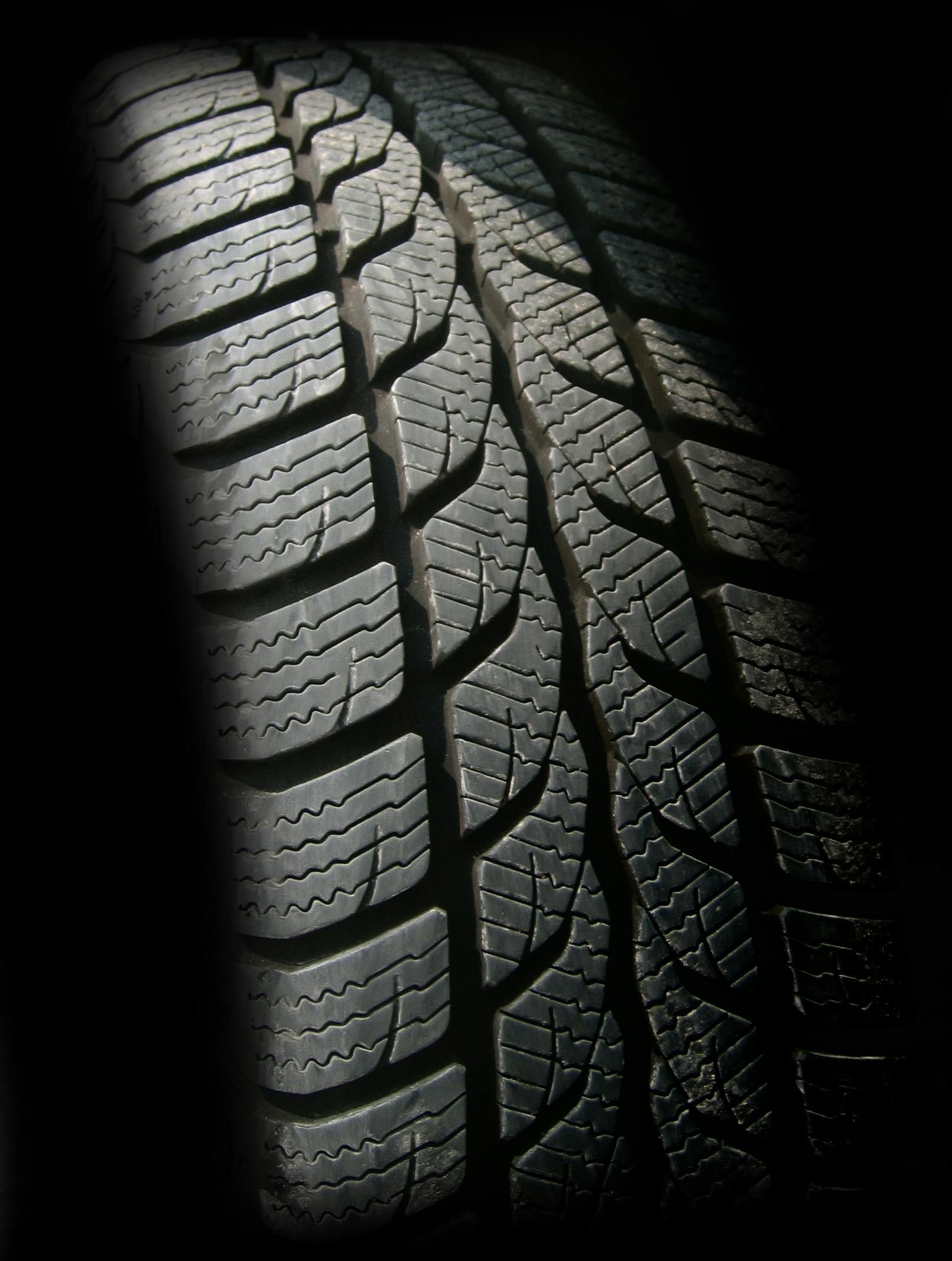
Choosing the right tires for Central Florida driving isn't the same as buying tires in Michigan or Colorado. Lakeland's unique combination of intense heat, sudden thunderstorms, and varied road surfaces requires specific tire considerations. Whether you're commuting on I-4, navigating downtown Lakeland's brick streets, or driving to the beaches on weekends, the right tires can make a huge difference in safety, comfort, and cost. Understanding Lakeland's Driving Challenges Central Florida presents unique tire challenges that many drivers don't fully consider: Intense Heat: Summer temperatures regularly exceed 90°F, with pavement temperatures reaching 140°F or higher. This extreme heat accelerates tire wear and can cause blowouts if your tires aren't designed for hot weather driving. Heavy Rainfall: Florida receives more lightning and rainfall than almost anywhere else in the country. Lakeland averages over 50 inches of rain annually, much of it coming in sudden, intense downpours that create dangerous driving conditions. Road Surface Variety: From I-4's smooth concrete to downtown Lakeland's historic brick roads, from the Polk Parkway's newer asphalt to rural roads with loose gravel shoulders, tire versatility matters. Stop-and-Go Traffic: Whether it's theme park traffic, construction zones, or daily commuting, frequent stopping and starting increases tire wear and heat buildup. Year-Round Driving: Unlike northern climates, Florida drivers put year-round mileage on their tires without seasonal storage breaks. All-Season vs. Summer Tires for Florida All-Season Tires are the most popular choice for Lakeland drivers, and for good reason. They're designed to handle a wide range of conditions, from dry highways to wet city streets. Modern all-season tires perform well in Florida's heat and provide good wet weather traction for our frequent afternoon thunderstorms. Benefits for local driving: Excellent wet traction for sudden rain Heat-resistant compounds that handle Florida temperatures Longer tread life in consistent warm weather Good performance on varied road surfaces Summer Tires offer superior dry road performance and are designed specifically for warm weather. However, they may not provide the wet weather traction that Central Florida's unpredictable rainfall demands. Winter Tires are unnecessary in Lakeland's climate and can actually be dangerous, as they're designed for temperatures below 45°F and will wear quickly in our heat. Key Features for Central Florida Tires When shopping for tires in Lakeland, prioritize these features: Heat Resistance: Look for tires with heat-resistant rubber compounds and strong internal construction. Tires that can't handle Florida's heat will fail prematurely and potentially dangerously. Wet Traction: Deep tread patterns and specialized rubber compounds help channel water away from the tire and maintain grip on wet roads. Look for tires with high wet traction ratings. Tread Life: Florida's year-round driving means you need tires that last. Look for tires with good tread life warranties, but remember that aggressive driving and hot weather will reduce any tire's lifespan. Load Rating: Make sure your tires can handle your vehicle's weight plus cargo, especially important for trucks and SUVs popular in Central Florida. Speed Rating: Choose tires rated for highway speeds, as much of Central Florida driving involves interstate travel at 70+ mph. Popular Tire Types for Local Conditions Grand Touring All-Season: These offer a good balance of comfort, longevity, and performance for drivers who primarily stick to paved roads around Lakeland and Central Florida. Performance All-Season: Ideal for drivers who want better handling and shorter stopping distances while maintaining wet weather capability. Good for those who frequently drive I-4 or other highways. Highway/Touring: Designed for SUVs and light trucks, these tires prioritize comfort and fuel economy while handling Florida's mix of highway and city driving. All-Terrain: For drivers who venture onto unpaved roads, beaches, or construction sites. These provide extra durability and traction off-road while remaining suitable for daily driving. Tire Maintenance in Florida's Climate Proper maintenance extends tire life and improves safety in our demanding climate: Check Pressure Monthly: Heat causes air to expand, so tire pressure changes significantly between morning and afternoon. Check pressure when tires are cool, preferably in the morning. Rotate Regularly: Florida's heat accelerates uneven wear. Rotate your tires every 5,000-7,500 miles to ensure even wear patterns. Inspect for Heat Damage: Look for signs of heat stress like cracking, bulges, or excessive wear. Florida's sun and heat can damage tire sidewalls even when tread looks good. Monitor Tread Depth: Use the penny test or tread depth gauge to ensure adequate wet weather traction. Replace tires when tread depth reaches 4/32" rather than waiting for 2/32", especially given our heavy rainfall. Protect from UV Damage: Park in shade when possible and consider tire covers for vehicles stored outside long-term. When to Replace Tires in Central Florida Don't wait until your tires are completely worn out. In Florida's wet conditions, replace tires when: Tread depth reaches 4/32" (better wet traction than the traditional 2/32" minimum) You notice cracking or weathering from heat and UV exposure Vibration or noise indicates internal damage Uneven wear patterns suggest alignment or suspension problems Any visible damage from potholes or road debris Budget Considerations for Local Drivers Quality tires are an investment in safety, especially in Florida's challenging conditions. While premium tires cost more upfront, they typically: Last longer in hot weather Provide better wet weather safety Offer improved fuel economy Include better warranties However, mid-range tires from reputable manufacturers often provide excellent value for typical Lakeland driving needs. Shopping Local vs. Online Local tire shops offer advantages that online retailers can't match: Professional installation and balancing Proper disposal of old tires Local expertise about road conditions Immediate service for emergencies Ongoing maintenance and rotation services Professional installation is especially important in Florida, where improper mounting can lead to dangerous blowouts in extreme heat. Don't Compromise on Safety Your tires are the only part of your vehicle that touches the road. In Central Florida's challenging driving conditions—from sudden downpours to scorching heat—quality tires aren't a luxury, they're a necessity for safe driving. Need help choosing the right tires for Lakeland's roads? Joyce Automotive and Towing has been helping Central Florida drivers select and maintain tires since 1968. Our experienced team understands local driving conditions and can recommend tires that perform well in our heat, rain, and varied road surfaces. We offer professional installation, balancing, and ongoing maintenance to keep you safe on the road. Call (863) 249-0162 or visit us at 1034 E Main St in Lakeland. From tire selection to rotation and alignment, we provide complete tire services for Central Florida drivers. We're open Monday through Friday 8:00 AM to 5:30 PM and Saturday 8:00 AM to 2:00 PM. Don't gamble with your safety—let our tire experts help you choose the right tires for your vehicle and driving needs!
Expert AC and heat repair by Joyce Automotive and Towing in Lakeland, FL. Stay comfortable with our HVAC services. Schedule an online appointment now.
